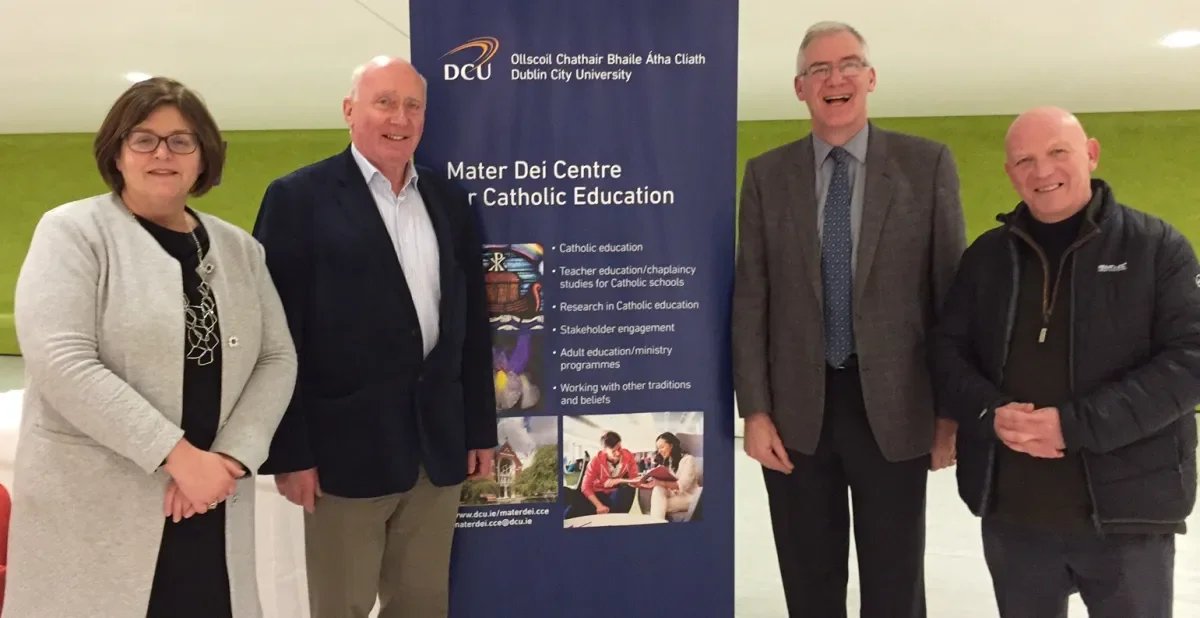

Professor Jim Gleeson, Australian Catholic University (ACU), Brisbane
Integrating a Catholic perspective across the curriculum of Catholic schools, beyond RE: Research from Queensland, Australia
The Mater Dei Centre for Catholic Education (MDCCE) was delighted to host a well-attended discussion led by Professor Jim Gleeson, Australian Catholic University (ACU), Brisbane, on Wed 31stJanuary, 2018, chaired by Dr. Gareth Byrne, Director of MDCCE. Professor Gleeson is the inaugural Professor of Identity and Curriculum in Catholic Education at ACU.
An account of Professor Gleeson’s research with Maureen O’Neill, involving 2,300 teachers in Queensland, appeared in Australian Curriculum Studies, 18 April 2017, under the title: Curriculum, culture, and Catholic education: A Queensland perspective’ and the action research study which followed, interviewing teachers in eight schools, provided the background to the discussion, highlighting also the relevance of the findings for Catholic schools in Ireland today.
Professor Gleeson noted that 22% of school-going population in Australia attend Catholic schools, of which there are 1700, and that 53% of Catholic children attend Catholic schools. The Catholic education landscape in Australia, he explained is characterised by ‘detraditionalization and pluralization’, with growth in Catholic schools often being maintained by middle class families of other Christian denominations and non-Christian faiths (Muslim, Buddhist, Hindu) that is, by upwardly mobile parents for predominantly pragmatic rather than religious reasons. He noted Church documents which indicate that Catholic schools cannot simply respond to demands of ever-changing economic realities: ‘Catholic schools think out their curricula to place centre-stage both individuals and their search for meaning.’ (Educating to Intercultural Dialogue in Catholic Schools, 2013). The research found that when teachers were asked why teach in a Catholic school, ‘school environment’ came out well ahead of ‘faith commitment’. In responding to the purpose of Catholic schools, teachers emphasised ‘provide a safe and caring environment’ ahead of faith-based education. Regarding the characteristics of Catholic schools, ‘caring community’ was indicated well ahead of all faith-based items. Teachers who were longer in role were closer to curriculum issues that might touch in on Catholic ethos and more readily found time for such issues in the classroom.
The findings of the research show that when it came to a Catholic perspective in the classroom, beyond the religious education classroom, there was a tendency towards engaging with spontaneous 'teachable moments' rather than pursuing formal planning. Professor Gleeson highlighted the accessibility of Catholic Social Teaching as a stimulus for reflection with all pupils in Catholic schools across subject areas
Brief responses were made to professor Gleeson’s presentation by Dr. Maire Griffin, CEO of CEIST and Dr. Aiveen Mullally, Marino Institute of Education, before the conversation was opened for discussion to all attending.
Dr. Griffin pointed up some key questions for Irish schools: What is the culture in our Catholic schools? How is it expressed? What is the story we tell our children? She highlighted the implications for in-service for teachers in Catholic schools if their Australian colleagues are aware of a knowledge deficit, especially if those teachers most positively disposed towards the integration of culture and curriculum in Catholic schools are more senior. She asked too if it is enough to rely on teachable moments or does Catholicity have to be formalised in the curriculum, remarking that the Catholic School Partnership process for Primary and Secondary ‘Understanding and Living the Ethos in a Catholic Voluntary Secondary and Primary School’ should assist in focusing teachers on the Catholic culture in their schools. There is an obvious interface too between curriculum and culture in Catholic schools, she said, in the new wellbeing provision in second-level schools and also in the new RE specification being prepared for use in these schools.
Dr. Mullally focused on the question of inclusion and different beliefs in Catholic schools. Church documents strongly state that to be Catholic is to live a life focused on inclusivity. She asked, how then can Catholic schools ensure that students of differing beliefs are facilitated during the spontaneous teaching moments described, and across subject areas?
Becoming more aware of the human rights frame of reference in all schools, how does the Catholic school welcome and embrace other beliefs while remaining true to the characteristic spirit of their school and the Gospel values that motivate Catholic education?
Dr. Byrne then opened the conversation to the floor, with many of those participating in the evening seeking to contribute to a lively debate. There was general agreement that the opportunity to discuss research findings focused on Catholic education was an important initiative that should be followed through further by the MDCCE and interested partners. The possibility of research, such as that discussed from Queensland, being replicated in Ireland, it was felt, would be very helpful in moving the conversation about the contribution of Catholic education to contemporary Irish society beyond anecdote.
